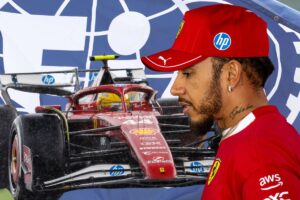Max Verstappen Sparks F1 Firestorm with Bold Accusation Against Christian Horner Over… Read more

Max Verstappen Sparks F1 Firestorm with Bold Accusation Against Christian Horner Over Liam Lawson’s Axing
Formula 1 has been thrown into disarray following a dramatic outburst from Max Verstappen, who took to Instagram to accuse Christian Horner, team principal of Red Bull Racing, of bullying. The triple world champion didn’t hold back as he publicly criticized the team’s decision to drop Liam Lawson, describing it as unjust and deeply disrespectful. Verstappen’s unexpected and candid social media post has not only shocked fans but also raised pressing questions about Red Bull’s internal operations and the future of its star driver.

Known for his laser focus on the racetrack and his preference for keeping off-track issues private, Verstappen’s choice to go public marks a significant shift in tone. His Instagram story addressed more than just disappointment over Lawson’s exit—it claimed the young Kiwi was mistreated and that Horner’s actions crossed a professional line. The Red Bull leader was accused of creating an oppressive atmosphere that ultimately influenced Lawson’s controversial removal from the team.
The 22-year-old Lawson impressed during his stand-in appearances while Daniel Ricciardo recovered from injury, with many in the F1 world expecting him to secure a more permanent role. However, Red Bull reinstated Ricciardo as soon as he was fit, and Lawson was sidelined without clear justification. Verstappen’s intervention suggests that the decision wasn’t purely performance-based, and his reference to bullying implies a more toxic team environment than previously suspected.
Verstappen’s statement has brought simmering tensions at Red Bull Racing to the surface. His frustration appears to stem not only from sympathy for Lawson but from broader concerns over how the team handles its young drivers. It also raises alarms about Verstappen’s own future with the team, especially if he feels that core values such as fairness and respect are being undermined.

The implications of this public feud are potentially vast. Red Bull Racing has built its modern legacy around Verstappen’s talent, with the Dutch driver being central to their recent dominance. Yet, with Verstappen openly challenging the team’s leadership, the partnership may now be under serious strain. Christian Horner, long regarded as a key figure in Red Bull’s success, could now be facing a pivotal moment in his leadership.
How the team responds to this growing internal conflict will shape its trajectory in the months to come. Red Bull must now choose between mending fences with Verstappen—possibly reconsidering its stance on Lawson—or risking a deeper rift with its most valuable driver. Verstappen’s influence means he holds significant power in this equation, and his discontent could force Red Bull into making substantial changes.
Meanwhile, for Liam Lawson, Verstappen’s vocal support has brought renewed attention to his talents and prospects. While it remains uncertain whether Red Bull will offer him another shot, the backing of a top driver like Verstappen could open doors elsewhere in the paddock.

Beyond Red Bull, this saga reflects a changing landscape in Formula 1. As drivers become more outspoken and active on social media, the old culture of silent compliance is being challenged. Verstappen’s willingness to speak out for a teammate signals a shift toward greater driver empowerment and accountability from team management.
Ultimately, the fallout from this incident could redefine Red Bull’s internal culture and influence how other teams manage their talent. As the F1 world waits for the next development, one thing is certain: Verstappen’s bombshell has sparked a conversation that won’t be fading anytime soon.





